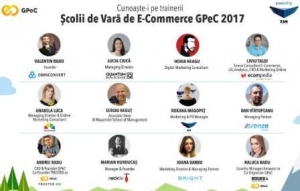Articole filtrate dupa data: Iulie 2017
Cum sa-l intelegem pe Michael Porter - Ghid esential despre concurenta si strategie
De ce recenzii de carti? Pentru ca in ultimii ani am reusit sa recomand un numar suficient de mare de carti cunoscutilor (prieteni, colegi, rude, copiii colegilor etc) in mod natural, doar povestindu-le impresii legate de o anumita lectura, dar si ce am pastrat pentru bagajul de cunostinte, la finalul ei. Partea frumoasa este ca nu m-am limitat doar la beletristica, adaugand in lista si carti de dezvoltare personala. Consider ca o carte tiparita isi atinge scopul daca este citita de cel putin 5 persoane, lucru des intalnit cu parte din cartile existente in biblioteca personala.
De ce o carte care il are ca "personaj" principal pe Michael Porter? Pentru ca i-am regasit numele de mai multe ori in lecturile de specialitate, dar mai ales la cursurile pe care le urmez in cadrul Institutului de Marketing. Cautand carti scrise de acest savant in economie, care a reusit sa inspire milioane de oameni in intreaga lume cu privire la concurenta de piata si strategie, am dat peste acesta, scrisa nu de domnia sa, cel mai citat profesor si cercetator in economie si afaceri, ci de Joan Magretta, fost editor la Harvard Business Review, colaborator al lui Porter si actual Senior Associate la Institute of Strategy and Competitiveness din cadrul Harvard Business School.
Ce am invatat eu din aceasta carte? Fix opusul a ceea ce aud zilnic de la leaderii din companiile de top legat de strategiile organizatiilor pe care le conduc, respectiv "fiti unic, nu cel mai bun. Crearea de valoare si nu doborarea adversarilor, este ceea ce se afla in miezul concurentei." In acceptiunea lui Porter "strategia explica modul in care o organizatie, confruntata cu concurenta, va realiza o performanta superioara."
Cum este structurata cartea? Aceasta este impartita in doua capitole principale, concurenta si strategia. Cartea este una practica intrucat ne ajuta sa facem imediat legatura cu viata reala de business si sa identificam incorectitudinile de zi cu zi. Cele mai frecvente greseli legate de concurenta sunt acelea ca analizam superficial competitorii, ca ne limitam la a investiga doar competitorii directi si poate pe potentialii “nou veniti” si de cele mai multe ori uitam de “substitute”, produsele sau serviciile care servesc acelorasi nevoi. Metoda recomandata de Porter in a analiza piata si a intelege ca de fapt concurenta nu este cucerirea unui client, ci castigarea de profit, ii poarta numele, respectiv “cele 5 forte ale lui Porter”. O companie concureaza nu doar cu competitorii directi pentru a obtine profit, ci si cu clientii, care cer intotdeauna mai mult si prefera sa plateasca mai putin, cu furnizorii si producatorii.
Legat de strategie, intotdeauna l-am considerat un cuvant mare, insa dupa parcurgerea cartii a devenit un termen mai putin complicat, intrucat “esenta strategiei este sa alegi ce NU trebuie sa faci”, ceea ce se traduce in “compromis strategic”. Cu alte alte cuvinte in faza in care se analizeaza industria/piata este recomandat sa se faca alegeri in privinta segmentelor ce pot fi servite, iar o eroare des intalnita este aceea de a-ti propune sa deservesti pe cat mai multi clienti, daca nu pe toti.
Poti intelege notiunile, chair daca nu esti un consultant sau un specialist in strategie? Da, le poti intelege pentru ca scopul acestei carti scrise de Joan este exact acela de “a deslusi, simplu, clar si aplicat, conceptele si modelele care au devenit AND-ul managementului adevarat”. Fiecare notiune (ex: promisiunea de valoare) este explicata de autoare, este asezata intr-un context si bineinteles este insotita de exemple din diferite industrii pentru ca cititorul sa poata pune in aplicare de a doua zi cele invatate citind cartea.
Regasim vreo interventie directa a personajului principal in carte? Da, la finalul cartii se regaseste un interviu cu Porter, care raspunde la toate intrebarile pe care manageri de-a lungul timpului si le-au pus in activitatea lor, intrebari structurate de Joan in greseli comune si obstacole, oportunitati si capcane, strategie si inovare, conducerea organizatiei.
A existat ceva ce nu mi-a placut la aceasta carte? Nu as putea face o astfel de afirmatie, insa daca esti obisnuit cu termeni ca Value Poposition, Return on Investment etc si ii folosesi des in lb engleza, ai nevoie de putin timp ca sa te obisnuiesti cu termenii in limba romana. La finalul cartii exista insa un glosar cu termenii folositi, ceea ce ajuta cititorul.
De ce recomand aceasta carte? Pentru ca este una aplicata, pentru ca nu trebuie sa ai un MBA pentru a intelege notiuni elementare de strategie si concurenta, dar si pentru ca este bine sa fii pregatit sa intervii atunci cand la crearea unui plan de valoare deciziile incep sa fie luate intr-o directie gresita, din lipsa cunostintelor de baza.
Brand Management Ideas for the Digital Age
Brand management still has its challenges, especially in the digital age. How can marketers perform better? We invited one of our Oxford College of Marketing’s trainers, Paul Hitchens, specialized in brand management to share its knowledge and expertise with the Romanian professionals.
Paul is the author of two bestselling ‘Teach Yourself’ guide books on branding: ‘Brand Management – In a Week’ and ‘Create the Perfect Brand’ (published by Hodder & Stoughton). He is Creative Director of Verve Brand Consultancy (www.verve.co.uk) with over 30 years’ experience in the Creative Industries. Paul has worked in Advertising, Branding, Design and Marketing and helps organisations of all types and sizes to realise their brand’s potential through Strategic Consultancy, Creative Services, Seminars and Training Workshops. He is a Chartered Marketer and Course Director for the CIM and frequently provides industry comment for television, radio, national and trade press. Paul has appeared on BBC, ITV and Channel 5 News. At Institutul de Marketing in Romania, Paul delivered customized brand trainings in Romania for some big FMCG companies in the region.
What are the main problems and opportunities for brands and brand management over the next years?
The main problem for brands in 2017 is the wide scale loss of trust. The results of the Edelman Trust Report 2017 make it clear that trust in organisations is in a state of crisis and this issue is global. The four areas of business, government, media and Non-Government Organisations have seen a drop in public confidence since 2012. This collapse of trust combined with an economic slowdown and a perception of falling standards creates a cautious climate. We are living through an age of disruption where doing things differently and breaking away from conventional thinking delivers the strongest results. The world of Politics has provided some big surprises to those that were looking in a different direction. To regain confidence in society, brands must place values and ethos above value and profit. As the MD of the International Monetary Fund, Christine Lagarde, said “We need investors and financial leaders taking values as seriously as valuation, and culture as seriously as capital.”
The main problem for brands in 2017 is the wide scale loss of trust.
What can Brand Managers do?
Senior Management, Marketing and HR must work together to define their brand’s Key Brand Criteria and implement a comprehensive strategy that engages all stakeholders:
- Purpose: Find your true purpose and attract willing advocates happy to help build the brand with you. A strong sense of purpose attracts employees, suppliers and customers and helps brands outperform those who don’t.
- Vision: Champion an engaging idea of the brand’s future that can be understood and shared by every stakeholder. Can your employees and customers visualise their part in this future? Do they feel motivated to realise this dream?
- Values: Be clear what the core values of the brand are. Values provide an ethical navigation system that equips employees with a set of behaviours that earn trust from all stakeholders.
- Mission: It’s essential to have a manifesto that is shared by the management team. Your brand can be based on a firm charter to remind its stakeholders that they are united by an ideology that will be measured by their behaviour.
- Proposition: Be very clear what your brand offers that can’t be gained from your competitors. You may be operating in a crowded sector or category but you can differentiate a brand by attitude and ethos.
- Positioning: A strong brand should ideally be the first product, service or organisation people think of when making a choice. You may be the first choice for a variety of reasons: price, quality, happiness or security.
- Personality: A brand’s personality is derived from its sense of purpose, vision and values. These qualities drive the brand’s behaviour and are expressed through its culture and performance.
- Audience: Connect with your audience through a shared ethos and build a community built on mutual trust and respect. Deeper bonds of loyalty are earned when a brand understands and interacts honestly with its audience.
Brands must embrace the power of sincere emotional connection.
What are smart brands doing well to cope with today's challenges?Could you give us some examples?
To prosper and grow in a challenging business climate, smart Brand’s must reach out and engage all stake holders by appealing to their hearts and their minds. Brands must embrace the power of sincere emotional connection.
What can Brand Managers do?
- Ambassadors: Brand Managers must aim to be exemplary Ambassadors for their brands and practice their values. Success is achieved by guiding and nurturing a positive ideal and not by aggressive policing and enforcement.
- Collaborators: Social media channels make it easier than ever before for brands to collaborate with their stakeholders and grow together. Brands from different sectors can work together under a shared ethos.
- Innovators: Brand’s that do not innovate will stagnant and compromise their future. Successful Brand Managers must embrace new ideas that align with their values and not be afraid of change.
- Emotional intelligence: Brand Managers must be aware of the brand’s impact on the world and its effect on its market environment. The ability to sense the mood of its key stakeholder relationships with empathy and confidence is essential.
- Communicator: A consistent tone of voice and articulation of the brand narrative, are essential online and across all social media just as they are in the physical world of packaging and print. If the narrative varies from medium to medium, the audience will sense discord.
- Curator: The modern Brand Manager is a curator of brand meaning across all brand touchpoints. Every expression of the brand is an opportunity to bring its nature to life whatever the circumstance.
- Futurologist: Your brand needs to be where your audience expects it to be. Don’t leave technology to the youngest member of the team or ignore new developments. You won’t need a crystal ball, but a keen interest in new technology and an open mind as to what may be possible can pay dividends.
Which are the most common pitfalls that brands are trapped into, especially with the new digital environment?
Digital technology is a powerful tactical asset for any Brand Manager but it is not a replacement for a strong brand strategy. Brand Managers need to think about how they use data and recognise what they are looking for to gauge the effectiveness of the brand strategy. There is an obsession with measuring everything but too often we forget to feel. A strong set of brand values provide clear direction on what to measure to appraise a brands health.
A strong set of brand values provide clear direction on what to measure to appraise a brands health.
What can Brand Managers do?
- Tribes: Socially connected brands engage with their stakeholders through events and online activities to provide a platform for shared experience and advocacy. Embrace your Brand Tribes and strengthen the emotional ties with those groups of like-minded people.
- Storytelling: Leading brands have a strategic narrative that enables engaging stories, myths and legends to be built around the brand and its sense of purpose. Stories are exchanged by brand advocates and admiration for the brand grows organically.
- Employer Branding: An effective Employer Brand attracts and retains the type of people it needs and wants. Brand Managers and HR Managers must collaborate and work together to realise the potential to create a corporate culture where everyone is a brand ambassador.
- Disruption: Where markets have become stale or filled with similar brands, there is an opportunity to turn the space on its head and offer a difference. Brand Managers must commit to innovation if their brand is to continue growing and deliver on its customer promise.
- Convergence: The lines between management disciplines and corporate departments are blurring. Effective Brand Managers must work across these silos and bridge the divide with a holistic approach to managing their brand. Customers are now advocating and recommending brands online, consumer to consumer.
- Authenticity: Brands often fail because they over promise or pretend to be something they are not. Authenticity in thought, word and deed is essential or the truth will out. Provenance is part of the brand narrative and can provide inspiration for storytelling and insights to share the experience and ideology of the brand.
Marketing digital la scoala de vara GPeC
GPeC, cel mai mare eveniment de eCommerce din Europa Centrala si de Est, anunta organizarea celei de-a saptea editii a proiectului Scoala de VaraGPeC.
In perioada 23-28 august, 12 mentori vor sustine 18 ore de cursuri intensive de comert electronic si marketing online in fata a 50 de participanti. O parte dintre temele abordate in cadrul evenimentului sunt: optimizarea conversiilor, cursuri practice de usability, campanii AdWords si SEO, informatii despre Marketing Online si Social Media, logistica sau Customer Experience.
”Am inceput Scoala de Vara GPeC acum sapte ani din dorinta de a ajuta antreprenorii online si pe toti cei care activeaza in domeniul eCommerce. Piata locala este intr-o continua expansiune, iar nivelul celor ce vor sa isi deschida un magazin online sau lucreaza deja in domeniu trebuie sa fie unul ridicat. De-a lungul editiilor de pana acum, am rafinat cursurile si subiectele pe care le abordam, pastrand tot timpul o abordare cat mai pragmatica si axata pe exemple concrete. Obiectivul nostru este de a le oferi participantilor cunostintele si uneltele necesare pentru ca acestia sa isi poatai mbunatati activitatea si sa vina catre clientii lor cu servicii cat mai bune”, mentioneaza Andrei Radu, CEO & Founder GPeC.
Pana in prezent, peste 300 de cursanti au participat la cursurile organizate de GPeC pe perioada verii. Programul de mentorat se adreseazaatat celor pasionati de comertul online, antreprenorilor ce si-au deschis deja propriul magazin online, cat si furnizorilor de serviciisisolutiieCommerce, procesatorilor de plati, companiilor de curieratsiagentiilorspecializate.
Mentorii acestei sesiuni de vara sunt: Valentin Radu (Fondator Omniconvent), Horia Neagu (Digital Marketing Consultant), Lucia Ciuca (Managing Director Quantum Data Science), Liviu Taloi (Senior eCommerce Consultant), Anabela Luca (CEO adLemonade), Sergiu Negut (Business Angel si Associate Dean in cadrul Maastricht School of Management), Roxana Magopet (Marketing & PR Manager FAN Courier), Dan Virtopeanu (ManagingPartnerBreezeMobile), Marian Hurducas (Manager &FounderNecktie Agency), Ioana Barbu (ManagingPartner Bright Agency), alaturi de Raluca Radu (Country Manager Answear.ro) si Andrei Radu (Fondator GPeC).
“Pentru mine, Scoala de VaraGPeC a fost o surpriza foarte placuta: sesiunile de training sunt concentrate si urmate de activitati practice, ce ii transforma pe oameni din simpli participanti intr-o adevarata echipa! Cat despre oameni… atat cursantii, cat si trainerii sunt acolo pentru ca vor sa cunoasca, sunt curiosi, entuziasti si motivati. Iar acest lucru conteaza enorm cand vrei sa creezi un mediu potrivit pentru invatare”, spune Lucia Ciuca, Managing Director Quantum Data Science, aflata pentru a doua oara in calitate de trainer la Scoala de Vara de E-Commerce GPeC.
Cei ce isi doresc sa participe in cadrul Scolii de VaraGPeC se pot inscrie pana la data de 1 august 2017 pe site-ul www.gpec.ro/scoala-de-vara-de-e-commerce-gpec/, beneficiind de preturi promotionale Early-Bird. Evenimentul se organizeaza la Family Hotel Arnica din Bran, judetul Brasov in perioada 23-28 august.
What can a marketer learn from making music? (3)
Solo or Ensemble? Both.
Making music is an exercise in expressing yourself and an experience in sharing with others. Music is both individuality and community, is both personal and mutual, is both private and public. Music will teach all these to a marketer:
Orchestra teamwork
No symphony was ever written for a single interpreter, no matter how proficient, or for a single instrument, no matter how complex. If not an etude, a capriccio or a solo part, a composition will always require a team of professionals, with specialized instruments, to work together to deliver harmony to the public.
Business is a complex composition, bringing together all the organization’s sections to play their dedicated parts, to contribute, in a well-thought and detail-crafted way, to the applauded success. Marketing itself, as the strings section of an orchestra, is also a complex of tools and means, each playing their important part in the opera. And, as in a symphonic orchestra, for the success of the composition, marketing section should get the central position of the stage.
Personal virtuosity
There is no successful orchestra with unskilled instrument players. Before participating in the collective creation of emotion, you need to know your theory, to master the instrument and to rehears the musical score thoroughly. As the smallest mistake will ruin the performance of all the team, each musician is responsible for playing perfectly his part, before joining the ensemble.
As marketing is a team effort, each marketer involved should master his own part and be prepared to bring the best in him to the business’ collective representation. And as a skilled interpreter cannot remain so without constant rehearsal, each marketer should always learn, constantly completing his knowledge and thoroughly sharpening his skills.
Collective jam session
The semi-improvised jam sessions of the jazz professionals, where instrumentalists gather to perform and out-perform each-other, are one of the greatest springboards of creativity, authenticity and inspiration and a great source of original musical creations. Requiring perfect rhythm and melody sensing, a great degree of theory knowledge and personal instrumental brilliance, jam session improvisations would bring out the best in the artists and would almost always produce great new musical pieces.
Marketers, as communicators, should know best that new ideas and actions would always require dialogue and participation. Marketers should also jam, in organized or informal gathering, exchanging ideas, challenges and experiences, in order to create effervescent industry knowledge and original market initiatives.
What can a marketer learn from making music?
Music is the mathematics of the feelings, the complex representation of the imagination, the total expression of the states of soul. Music can teach the marketer all of this and more:
Emotion
Music is one of the purest forms of expressing emotions, the measured way of stating the feelings, when all the rest of tools are not enough for the job. Music without emotion is only noise, only sound with no true meaning, while musicians, through well thought and played music, can inspire a whole world of emotions in the listeners.
As marketers, we need to learn, understand, create and deliver emotion to the public, which always will choose, more than the product, the way we make them feel, the way we play our music to them. Learning to create the right emotions, learning to express and transmit the right feelings is the very basis of marketing, as the fundamentals of interaction between individuals or organizations.
Creativity
Composing music is extremely complex and requires enormous amounts of creativity, of imagination, besides the very detailed knowledge of theory and of the capabilities of various instruments. Most composers were firstly talented interpreters, mastering one or more instruments before starting to write music. Although playing a musical piece is quite rigorous in following the composer’s indications, the interpreter always introduce his own sentiments, his own feelings, getting creative and actually interpreting, not simply reproducing the piece. This goes from the intensity of the notes to the accents and “breathing” throughout the piece, culminating with the overall musical show for the public.
Marketing strategy is in a way similar to composing a complex symphony, where there are numerous aspects of the score, with numerous instruments to bring their own original, creative contribution, in a harmonized way, for the great result of the business’ orchestra, to the applauses of the public. In the same way, all marketing activities should always be creative, even in the most standardized and automated channels or tools – with lateral thinking, surprising combination and original implementation of such tools.
Empathy
Music develops greatly the empathic capabilities, as the way to recognize and share the feelings encapsulated by author in the composition, but also as the way to resonate and transmit the emotions to the public. A musically trained person will be able to single-out one voice in a noisy environment, to identify and recognize emotions much faster and to immediately project them and understand the state of that person, while being able to reciprocate with the needed tone.
Marketers without empathy to the business will not be able to interiorize the goals.
Marketers without empathy to the business will not be able to interiorize the goals, to sense the needed path and come with the right course of action for the organization. Marketers without empathy to the public will not be able to resonate to their needs, to understand their feelings and to respond with the right, convincing voice.






